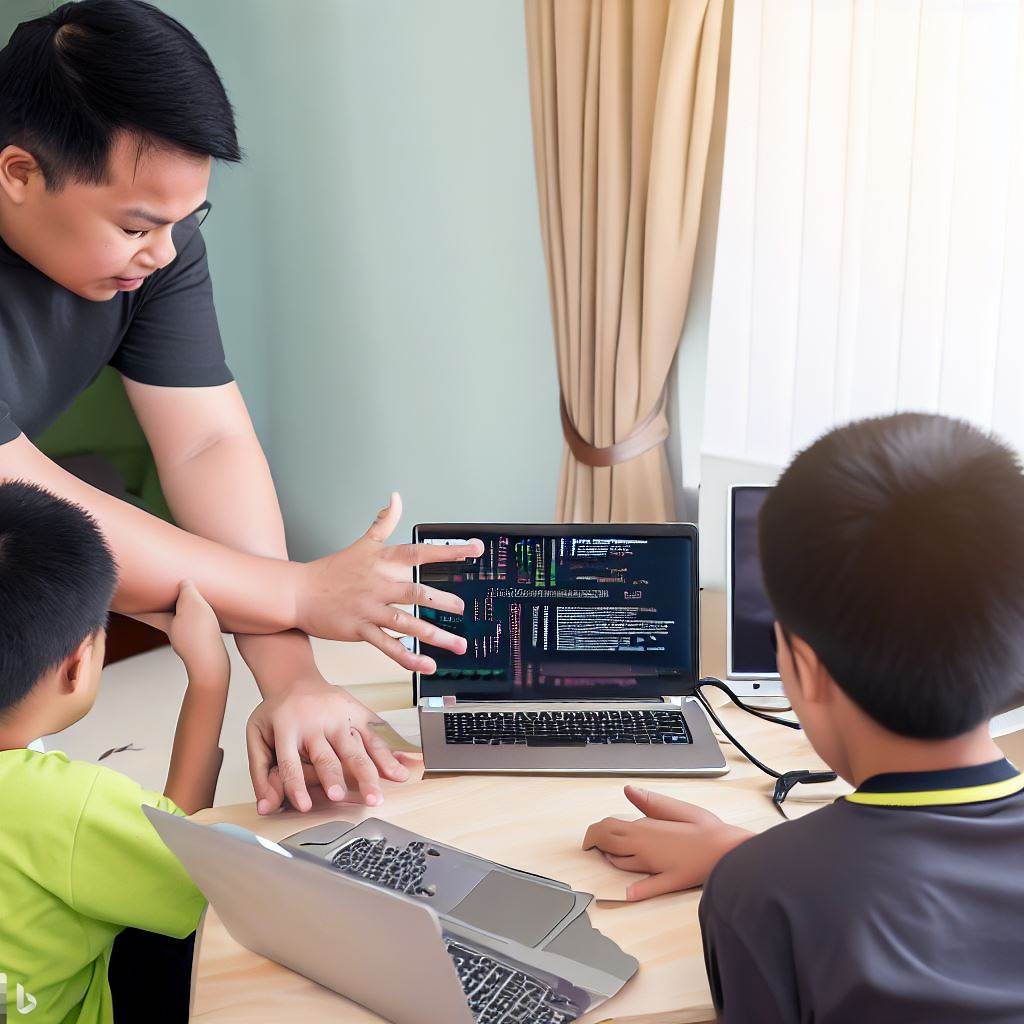Introduction
Coding wars are intense battles that occur in the world of programming, where programmers go head-to-head to showcase their skills.
These battles have gained immense significance in the programming community as a way to demonstrate expertise and learn from one another.
The popularity of coding battles has been on the rise, with programmers across the globe actively engaging in these competitions.
These wars provide a platform for programmers to test their abilities and push their limits.
Moreover, coding battles also foster healthy competition, encouraging programmers to constantly improve their skills and stay updated with the latest technologies.
The thrilling nature of these battles creates an atmosphere of excitement and a sense of achievement.
In addition to personal growth, coding wars offer valuable networking opportunities. Programmers can connect with like-minded individuals, share their experiences, and collaborate on future projects.
This reinforces the sense of community within the programming world.
Overall, coding battles serve as a catalyst for knowledge exchange, innovation, and growth in the field of programming.
They not only contribute to individual skill development but also shape the collective progress of the programming community as a whole.
As we delve into the top 5 legendary battles in the world of coding wars, we will witness remarkable displays of talent, determination, and passion.
The Battle of Turing’s Machine
Alan Turing, a renowned mathematician and computer scientist, left an indelible mark on the field of computer science, playing a pivotal role in its development.
Central to his contributions was the conceptualization of the Turing machine, a theoretical construct of immense significance in laying the foundation for modern computing.
The Turing machine, conceived by Turing, represents a theoretical device with the profound capacity to address a wide array of computational problems.
Additionally, the machine operated with a set of rules, known as the transition function, to process input and generate output.
Tech Consulting Tailored to Your Coding Journey
Get expert guidance in coding with a personalized consultation. Receive unique, actionable insights delivered in 1-3 business days.
Get StartedThis legendary coding battle’s impact on computer science was monumental, as it demonstrated the potency of theoretical models in addressing complex problems.
The Turing machine broadened the horizons of computation, igniting inspiration for further advancements in the field.
The Battle of Turing’s Machine also underscored the critical role of algorithms in computing.
Turing’s machine executed algorithms by adhering to predetermined sets of instructions, providing the foundational blueprint for algorithmic programming—a cornerstone of computer science.
Moreover, this battle emphasized the imperative of efficient problem-solving techniques.
Beyond computer science, the ramifications of this battle extended to the realm of artificial intelligence.
In essence, the Battle of Turing’s Machine, led by the visionary Alan Turing, wielded profound influence in the world of coding wars, revolutionizing computer science and the landscape of artificial intelligence.
Read: CodeMonkey and Girls: Closing the Gender Gap in Coding
The Compiler Wars
The Compiler Wars were a significant event in the world of coding, with various programming languages battling it out to establish dominance.
The historical context of these wars sheds light on their significance and the advancements made in compiler technology as a result.
1. Historical Context
- The Compiler Wars took place during the late 20th century, as computing technology rapidly advanced.
- Before compilers, programmers had to write in machine code, making programming a laborious and time-consuming process.
- Compilers revolutionized coding by translating high-level programming languages into machine code.
- The competition in the market led to fierce battles between programming language developers to create the best compilers.
2. Significance of the Battle
The battle between different programming languages and their compilers had immense significance
- The outcome of these battles shaped the future of programming languages and their adoption in various industries.
- Effective compilers could significantly improve the performance and efficiency of code execution.
- Languages with advanced compilers gained a competitive edge, attracting more developers and promoting their growth.
- Efficient compilers contributed to the development of complex software applications, expanding technological capabilities.
3. Major Players
Several languages and their respective compilers played a crucial role in the Compiler Wars
- C++: Derived from C, C++ competed with its powerful compilers like Visual C++ and GCC, supporting object-oriented programming.
- Java: Java introduced the Just-In-Time (JIT) compiler, enabling dynamic optimization for enhanced performance.
- C#: Developed by Microsoft, C# had the .NET Compiler Platform (Roslyn), providing advanced analysis and refactoring capabilities.
- Python: Although an interpreted language, Python’s compilers like Cython and PyPy optimized execution for better performance.
4. Advancements in Compiler Technology
The fierce competition in the Compiler Wars led to significant advancements in compiler technology:
- Optimization Techniques: Compiler developers focused on improving code optimization for faster execution.
- Language Interoperability: Compilers enabled easier integration between different programming languages, facilitating code reuse.
- Parallel Processing: Advanced compilers allowed parallel execution of code, harnessing the power of multi-core processors.
- Debugging and Analysis: Compilers incorporated sophisticated debugging tools and static code analysis to detect errors and enhance code quality.
- Portability: Cross-platform compilers emerged, enabling developers to write code once and run it on multiple operating systems.
Lastly, the Compiler Wars marked a significant period in coding history, driving advancements in compiler technology and shaping the development of programming languages.
Build Your Vision, Perfectly Tailored
Get a custom-built website or application that matches your vision and needs. Stand out from the crowd with a solution designed just for you—professional, scalable, and seamless.
Get StartedThe battles between different programming languages and their respective compilers were instrumental in improving code efficiency, performance, and portability.
The legacy of these wars continues to influence the coding world, pushing for further innovations in compiler technology.
Read: Is CodeMonkey Accessible for Special Needs Students?

The Open Source Revolution
In the world of coding wars, one battle that stands out is the Open Source Revolution.
This movement has had a significant impact on the coding community, challenging the dominance of proprietary software and shaping the current landscape of software development.
Overview of the Open Source Movement
The open-source movement is a collaborative approach to software development, where the source code of a program is made freely available for anyone to view, modify, and distribute.
The open-source community believes in transparency, collaboration, and the power of collective intelligence.
This movement gained momentum in the late 1990s and early 2000s, with the rise of projects like Linux, Apache, and MySQL.
These projects showcased the potential of open-source software and its ability to rival proprietary software in terms of performance, security, and reliability.
Battle between Proprietary Software and Open-Source Software
The battle between proprietary software and open-source software has been fierce. Proprietary software is developed by a single company or entity, and its source code is closely guarded.
It is often accompanied by expensive licensing fees, limited customization options, and limited community input.
On the other hand, open-source software fosters collaboration and allows developers to modify and enhance the code freely.
It empowers users to customize the software according to their needs, leading to a more flexible and adaptable ecosystem.
Companies like Microsoft, with their proprietary software like Windows, have faced stiff competition from open-source alternatives like Linux.
Optimize Your Profile, Get Noticed
Make your resume and LinkedIn stand out to employers with a profile that highlights your technical skills and project experience. Elevate your career with a polished and professional presence.
Get NoticedThe battle between these two ideologies has resulted in groundbreaking innovations and improvements in software development practices.
Influential Coding Battles within the Open-Source Community
- The GNU vs. Unix battle: In the early 1980s, Richard Stallman initiated the GNU project to develop a free and open-source operating system. This battle laid the foundation for the open-source movement.
- The Linux vs. Microsoft Windows battle: Linux, an open-source operating system, gained popularity and challenged the dominance of Microsoft Windows. This battle showcased the power of collaborative development.
- The Apache vs. Microsoft IIS battle: Apache, an open-source web server, surpassed Microsoft’s IIS in terms of market share, demonstrating the strength of community-driven software development.
- The MySQL vs. Oracle battle: MySQL, an open-source database system, posed a significant threat to Oracle’s proprietary offerings. This battle highlighted the robustness and scalability of open-source database solutions.
- The Git vs. Subversion battle: Git, an open-source distributed version control system, revolutionized the way developers manage their code. This battle showcased the power of decentralized collaboration.
Impact on the Current Landscape of Software Development
The battles within the open-source community have shaped the current landscape of software development in several ways.
Firstly, open-source software has become increasingly prevalent, with many developers relying on open-source libraries, frameworks, and tools.
This has resulted in faster development cycles, improved collaboration, and a wider pool of resources.
Additionally, the competitive nature of coding battles has driven continuous innovation within the open-source community.
Developers strive to outdo one another, leading to improved software quality, enhanced security measures, and greater user satisfaction.
Furthermore, the Open Source Revolution has influenced the mindset and approach of software development.
The emphasis on collaboration, transparency, and community-driven decision-making has become integral to modern development practices.
Additionally, the Open Source Revolution has had a profound impact on coding wars and the software development ecosystem.
The battle between proprietary software and open-source software has sparked countless coding battles, resulting in groundbreaking innovations and improvements.
The open-source movement continues to shape the current landscape of software development, empowering developers and users alike.
Read: History of Competitive Programming: The Great Coding Wars
The AI Showdown
In the world of coding wars, the role of artificial intelligence (AI) has been steadily increasing. AI algorithms have begun to compete against human programmers, leading to some epic coding battles.
These battles have far-reaching implications for the future of coding.
The Increasing Role of Artificial Intelligence
Artificial intelligence has become an integral part of the coding world. Its ability to analyze massive amounts of data, learn from it, and make intelligent decisions has revolutionized various industries.
With advances in machine learning and deep learning algorithms, AI can now handle complex coding tasks that were once considered exclusive to human programmers.
Companies and organizations are leveraging these AI capabilities to develop innovative applications and solutions.
Examples of Coding Battles: Humans vs. AI Algorithms
Several coding battles have taken place where AI algorithms have gone head-to-head with human programmers. These battles showcase the capabilities and limitations of both sides.
- Google’s DeepMind vs. World Chess Champion: In 1997, IBM’s Deep Blue defeated the world chess champion, Garry Kasparov. This battle demonstrated that AI could surpass human intelligence in strategic games.
- AlphaGo vs. Go World Champion: In 2016, Google’s AlphaGo defeated the world champion Go player, Lee Sedol. This victory marked a significant milestone in AI’s ability to tackle complex games with abstract rules.
- AI in Competitive Coding Contests: Coding competitions like Google Code Jam and Topcoder now witness the participation of AI algorithms. These algorithms compete against human programmers to solve challenging coding problems within a given timeframe.
Implications and Consequences of AI Coding Battles
These coding battles between AI algorithms and human programmers have profound consequences for the future of coding.
- The Evolution of Coding: AI’s presence in coding wars compels human programmers to enhance their skills and adapt to the evolving landscape.
It encourages them to explore new areas of specialization that complement AI’s strengths. - Collaboration between AI and Humans: AI algorithms can assist human programmers by automating routine coding tasks, finding patterns in data, and suggesting optimized solutions.
This collaboration has the potential to amplify productivity and foster innovation. - Ethical Considerations: The integration of AI into coding raises ethical questions. Who is responsible if an AI algorithm produces erroneous or biased code? Ensuring transparency and accountability in AI coding systems is crucial.
- Redefining Job Roles: As AI algorithms become more capable, some coding tasks may become fully automated.
This evolution could lead to adjustments in job roles, with programmers focusing on higher-level tasks like designing AI systems and ensuring ethical application of AI in coding. - Continuous Learning and Adaptation: Both AI algorithms and human programmers need to continuously learn and adapt to stay ahead in coding wars.
Skill development and staying updated with the latest trends in AI are crucial for programmers to thrive.
The AI showdown in coding wars brings exciting possibilities and challenges. As AI algorithms compete against human programmers, coding evolves, job roles transform, and ethical considerations surface.
Collaboration between AI and humans will shape the future of coding, demanding continuous learning and adaptation from both sides.
Read: How Coding Academies Prepare You for the Job Market
The Bug War
In the world of coding wars, one of the most critical aspects that programmers face is the challenge of debugging and bug fixing.
The ability to effectively identify and resolve bugs is a crucial skill that separates the good coders from the great ones.
The Importance of Debugging and Bug Fixing in Coding Battles
Debugging is the process of finding and eliminating errors or bugs in a program’s source code. It plays a vital role in coding battles as it ensures that the code performs as expected and delivers the desired results.
During coding battles, time is of the essence, and any bug can severely impact a coder’s chances of success.
The ability to quickly identify and fix bugs enables coders to maintain their momentum and deliver optimal performance under pressure.
Infamous Coding Battles Where Bugs Wreaked Havoc
- The Great Server Crash of 2005: In a highly anticipated coding battle, two teams were pitted against each other to develop a robust e-commerce platform.
Just as one team was about to claim victory, a critical bug in the code caused the server to crash, resulting in a complete system failure. - The Infinite Loop Debacle: Two coding prodigies went head-to-head in a battle to optimize an algorithm.
However, an elusive bug in one of the programs triggered an infinite loop, bringing the competition to a standstill. - The Data Leakage Catastrophe: In a highly confidential coding battle between rival intelligence agencies, a bug in the encryption algorithm resulted in data leakage.
The entire battle turned into a race to fix the bug before any sensitive information fell into the wrong hands. - The GUI Glitch Showdown: Two teams were competing to develop cutting-edge user interfaces, each aiming for perfection.
However, a bug in one of the programs caused graphic anomalies and erratic behavior, leaving the judges puzzled. The battle turned into a race to fix the glitch and restore normal functionality. - The Race Condition Mayhem: Two top coders were engaged in a speed-coding battle to develop a high-performance multi-threaded application.
However, a bug related to a race condition caused the program to produce unpredictable results. The coders had to quickly identify and fix the bug to salvage their chances of winning.
Lessons Learned from Bug-Related Coding Battles
These bug-related coding battles have had a significant impact on software development practices, leading to several valuable lessons:
- The Importance of Rigorous Testing: The battles highlighted the critical role of extensive testing in identifying and resolving bugs before they wreak havoc during a competition.
- Attention to Detail: The battles instilled in coders the importance of meticulous coding practices and thorough code reviews to minimize the likelihood of introducing bugs.
- Perseverance and Problem-Solving Skills: The battles reinforced the need for resilience and the ability to think critically under pressure when confronted with challenging bugs.
- Collaboration and Knowledge Sharing: The battles emphasized the significance of teamwork and knowledge exchange among coders to collectively overcome complex bugs.
- Continuous Learning and Improvement: The battles reminded coders of the ever-evolving nature of software development and the need to stay updated with best practices and bug-fixing techniques.
In general, the Bug War serves as a reminder of the criticality of debugging and bug fixing in coding battles.
These battles have demonstrated the detrimental effects bugs can have on the outcome and have led to important lessons that shape software development practices.
As the coding world continues to evolve, the ability to effectively debug and fix bugs remains an essential skill for any coder aiming for victory in the relentless battlefield of coding
Conclusion
In a nutshell, the world of coding wars has witnessed some truly legendary battles that have left a lasting impact on the coding landscape.
Firstly, the battle between Java and C++ revolutionized the programming world, with Java’s cross-platform capabilities and C++’s performance optimization techniques.
Next, the battle for supremacy between Python and Ruby showcased the power of simplicity and readability in programming languages.
The battle between JavaScript and TypeScript brought about a crucial shift towards stronger typing and better code maintenance in web development.
The ongoing battle between PHP and Node.js highlights the constant struggle for backend dominance, with PHP’s popularity in web development and Node.js’s event-driven architecture.
Lastly, the battle between artificial intelligence and cybersecurity has emerged as a critical battlefront, as AI is leveraged for both offense and defense.
These battles have significantly shaped the coding landscape by introducing new languages, frameworks, and concepts into the programming world.
Furthermore, they have sparked innovation and competition, leading to improved technologies and tools for developers.
It is important to note that coding wars are an ongoing phenomenon, with new battles continuously emerging as technology evolves.
These battles have a continuous impact on the evolution of programming, driving the industry forward and pushing boundaries.
Therefore, it is essential for programmers to stay updated and adaptable to remain relevant in this ever-changing coding wars.



